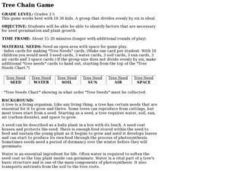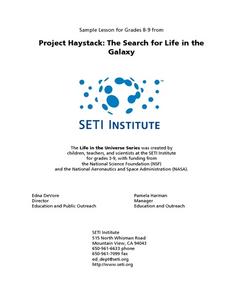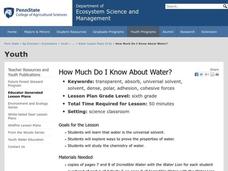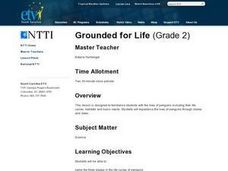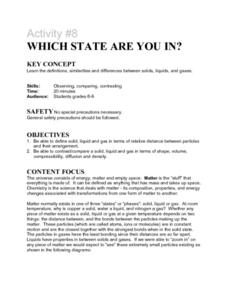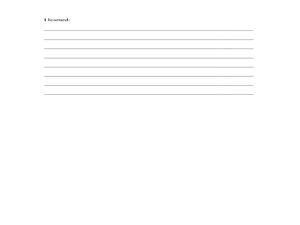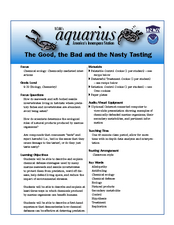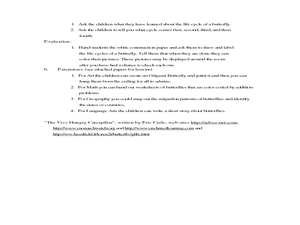Curated OER
Tree Chain Game
Students identify the necessary factors for seed germination and plant growth in a game format.
Curated OER
How Long Would It Take To Travel To the Stars?
Students consider the amount of time that it would take to get to the star, Sirius using various modes of transportation, some practical and some whimsical. The practicality of physically going to another star system is explored in this...
Curated OER
Habitat Is Home
Students are introduced to the concept and components of a habitat. They discuss the key components of a habitat and describe how certain factors can cause disturbances in a habitat and change its population. Activities are leveled for...
Curated OER
How Much Do I Know About Water?
Sixth graders explore ways to analyze the properties of water and examine the chemistry of water. In this water lesson students work in groups and complete several activities.
Curated OER
How Much Do I Know About Water?
Sixth graders explore how water behaves on a penny. In this states of matter lesson, 6th graders observe water as they add drops to a penny. This lesson helps students apply the adhesive properties of water to the water cycle.
Curated OER
Grounded for Life
Second graders become familiar with the lives of penguins including their life cycles, habitats and basic needs. Students will experience the lives of penguins through stories and video.
Curated OER
How Far Away is SOHO?
High schoolers create a scale model of the Earth and the sun that demonstrates where the SOHO satellite is in relation to the Earth.
Curated OER
Earth
Fourth graders engage in a study of the solar system. The teacher constructs an outside model of it. They walk through it making constructive observations. Students conduct a class discussion about the solar system and planets. They...
Curated OER
Rocky Observations
Students examine two images of rocks, make their own observations of individual rocks through drawing, and explain how the same observation skills can be used in the study of geology.
Curated OER
and and Ocean Views of Earth by Remote Sensing
Students explain how satellites help scientists to see more than with the unaided eye and how Landsat technology works. Students identify vegetation and fire sites in the rainforest and detect erosion along rivers. They are able to use...
Curated OER
Polarized Light
Students study polarized light and explain how they know it is polarized. In this polarized light lesson students complete a lab that shows them how light can be polarized.
Curated OER
Get Down With Density
Students define density and observe that things that are less dense than water will float. Students find the density of copper, iron and aluminum
Curated OER
Zen Gardens
Students study the design elements and symbolism of Japanese gardens through a hands-on lesson in Zen Garden design.
Curated OER
Falcon KWL Chart
Students create KWL charts about falcons. They write what they know about falcons and what they want to know about them. They read for information on falcons and complete the last column of their chart with the information they...
Curated OER
Activity #8 Which State Are You In?
Young scholars define, give similarites and differences between solids, liquids, and gases. They compare and contrast a solid, liquid and gas in terms of shape, volume, compressibility, diffusion and density. Pupils classigy common...
Curated OER
Heat and Matter
Students explore liquids and solids by conducting in class experiments. In this matter lesson, students define the properties of matter and how heat can change those properties. Students experiment with heating objects such as butter and...
Curated OER
Powers of 10
Students explore universe, and examine how big it really is and how scientists measure the distances or sizes of things by estimating sizes of different objects and reading and writing numbers in scientific notations.
Curated OER
Planting A Garden On Campus
Learners investigate the school campus area in order to plan the best spot for a class garden. They create a map of the school and research the different types of soil that exist in order to find the best spot. The class takes the...
Curated OER
Worms in a Bottle
Students gain a better understanding of the worm and its role in the recycling of organic materials into simpler forms by constructing worm bottles and observing for 60 to 90 days.
Curated OER
The Good, the Bad and the Nasty Tasting
Students examine the effect of chemicals from marine plants or animals on predator's preferences. In this ecology lesson, students conduct taste tests and collect necessary data. They write their conclusion after analyzing...
Curated OER
The Lifecycle of a Butterfly
Students study the life cycle of the butterfly. In this butterfly life cycle lesson, students examine and discuss a large diagram of the four stages of the butterfly life cycle. They read books and access web sites that extend their...
Curated OER
Build Your Own Telescope
Pupils build a simple astronomical telescope from two lenses and some tubes.
Curated OER
Recycling Relay
Learners improve their locomotor skills and their knowledge of recycling. They participate in a relay as they recycle different objects into their proper containers.
Curated OER
John Muir - Around the World in 76 Years
Sixth graders create timelines of John Muir's life while playing a game based on John Muir's travels. They discover that John Muir traveled around the world to compare and contrast natural phenomena and to speak out about preserving...
